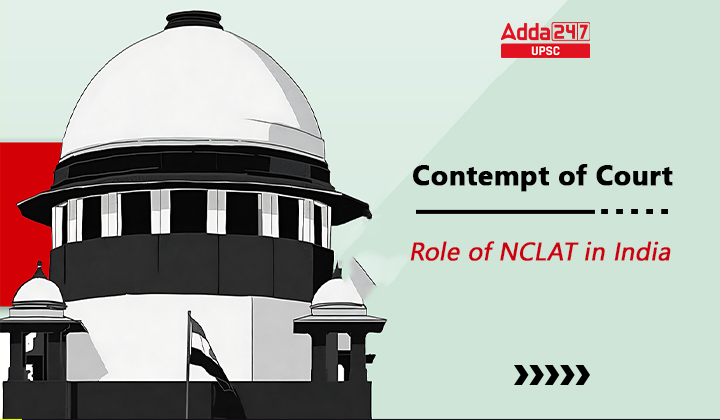Table of Contents
The recent issuance of a contempt of court notice by the Supreme Court to two members of the National Company Law Appellate Tribunal (NCLAT) has brought to light the complexities and challenges surrounding quasi-judicial bodies in India. In this article, we will delve into the details of the dispute relating to Finolex Cables, the roles of the National Company Law Tribunal and the NCLAT, and the significance of the contempt of court proceedings. Additionally, we will explore the role of the Competition Commission of India (CCI) and compare it with the erstwhile Monopolies and Restrictive Trade Practices Act, of 1969 (MRTP Act).
Finolex Cable Case
The recent Supreme Court action has its roots in a dispute concerning Finolex Cables, a well-known player in the Indian cable and wire industry. The dispute, which reached the NCLAT, involved allegations of corporate mismanagement and other legal issues. It is important to understand that the NCLAT is a quasi-judicial body responsible for hearing appeals from orders passed by the National Company Law Tribunal.
National Company Law Tribunal (NCLT) and National Company Law Appellate Tribunal (NCLAT)
What is the National Company Law Tribunal (NCLT)?
The National Company Law Tribunal (NCLT) is a statutory body established under the Companies Act, 2013, and is responsible for dealing with matters related to companies. It has both original and appellate jurisdiction. The NCLT handles various corporate disputes, including insolvency and bankruptcy cases.
What is the National Company Law Appellate Tribunal (NCLAT)?
The National Company Law Appellate Tribunal (NCLAT) is another quasi-judicial body established under the Companies Act, 2013. It serves as the appellate authority for matters decided by the NCLT. In essence, the NCLAT hears appeals against orders of the NCLT and also has other specified appellate powers.
The Difference Between NCLT and NCLAT
The primary distinction between NCLT and NCLAT lies in their jurisdiction and roles. NCLT handles original matters, while NCLAT is responsible for hearing appeals against NCLT orders. This two-tier system ensures that companies have a mechanism for appeal and redressal.
Contempt Court Notice for NCLAT Members
The recent Supreme Court action, issuing a contempt of court notice to two NCLAT members, raises significant questions about the functioning of quasi-judicial bodies. The notice was issued due to allegations that these members had defied the Supreme Court’s direction in the Finolex Cables case, thus undermining the authority and sanctity of the court’s orders.
This development highlights the importance of accountability, integrity, and adherence to the rule of law within the legal and quasi-judicial systems in India. It also underscores the need for a clear separation of powers and the importance of following established legal procedures, even within quasi-judicial bodies.
NCLAT, Statutory Body, or Constitutional Body
The National Company Law Appellate Tribunal (NCLAT) is a statutory body, not a constitutional body. This means that it derives its existence and powers from specific legislation, in this case, the Companies Act, 2013. As a statutory body, the NCLAT is subject to the legislative framework that created it.
NCLAT Members and Their Appointments
The members of the NCLAT are appointed based on the provisions of the Companies Act, 2013. Typically, the central government is responsible for making these appointments, and there is a specific selection and eligibility process. The appointment of members is crucial to ensuring the tribunal’s impartiality and expertise in corporate matters.
Functions and Roles of the NCLAT
The NCLAT has several important functions, which include:
Appellate Jurisdiction: The primary role of the NCLAT is to hear appeals against orders passed by the NCLT. This ensures that parties have an avenue for challenging NCLT decisions they believe are erroneous.
Adjudication: NCLAT also has adjudicatory powers, allowing it to make decisions on various corporate and insolvency matters.
Legal Interpretation: The tribunal is responsible for interpreting legal provisions related to corporate and insolvency laws.
Maintaining Consistency: NCLAT plays a crucial role in maintaining consistency and uniformity in the interpretation and application of corporate and insolvency laws across the country.
NCLAT Landmark Judgments: Over the years, NCLAT has delivered several significant judgments that have had a profound impact on corporate and insolvency law in India. Some landmark judgments include those related to major insolvency cases, mergers and acquisitions, and corporate governance issues.
Role of the Competition Commission of India (CCI)
Moving beyond the realm of corporate and insolvency matters, the Competition Commission of India (CCI) plays a critical role in ensuring fair competition and preventing anti-competitive practices in the Indian market.
CCI: Statutory Body or Constitutional Body?
The Competition Commission of India (CCI) is another statutory body established under the Competition Act, 2002. It is not a constitutional body but a regulatory authority tasked with enforcing competition laws.
Monopolies and Restrictive Trade Practices Act, 1969 (MRTP Act) and Competition Act, 2002 (Compare and Contrast
The MRTP Act, which was in force before the Competition Act, primarily focused on preventing monopolistic and restrictive trade practices. In contrast, the Competition Act, 2002, has a broader scope, encompassing issues related to anti-competitive agreements, abuse of dominant positions, and mergers and acquisitions that may have an adverse impact on competition.
Composition of CCI Members and Their Appointment
There is a chairperson and additional members of the Competition Commission of India that the Central Government appoints. Appointments are made following a rigorous selection process to ensure that CCI operates independently and effectively.
Functions and Role of the Competition Commission of India (CCI)
CCI functions and roles include:
- Ensuring Competition: CCI is responsible for promoting and sustaining competition in the Indian market.
- Investigating Anti-Competitive Practices: It investigates and takes action against practices that may have an adverse effect on competition.
- Approving Mergers and Acquisitions: CCI examines mergers and acquisitions to determine whether they are likely to cause an adverse impact on competition.
- Consumer Protection: CCI’s activities indirectly protect consumers by ensuring that markets remain competitive, leading to better choices and lower prices.
- Advocacy: The CCI also engages in advocacy to promote competition and prevent anti-competitive behavior through seminars, workshops, and publications.
Landmark Judgments of the Competition Commission of India (CCI)
CCI has been involved in several high-profile cases that have shaped the landscape of competition law in India. Some landmark judgments include those related to cartels, abuse of dominant positions, and mergers that have been scrutinized for their potential anti-competitive effects.
Conclusion
The recent contempt of court notice issued to two NCLAT members sheds light on the challenges and complexities of quasi-judicial bodies in India. It underscores the importance of accountability, integrity, and adherence to the rule of law within the legal and quasi-judicial systems.
Furthermore, understanding the roles and functions of the National Company Law Appellate Tribunal (NCLAT) and the Competition Commission of India (CCI) is crucial to comprehending the dynamics of corporate and competition law in the country. While NCLAT focuses on corporate disputes and appeals, CCI is tasked with ensuring fair competition and preventing anti-competitive practices in the market.
In an ever-evolving economic and corporate landscape, the roles and decisions of these bodies have far-reaching implications for businesses, consumers, and the overall health of the Indian economy. Hence, it is essential to closely monitor their functioning and their impact on the legal and economic framework of the nation.



 TSPSC Group 1 Question Paper 2024, Downl...
TSPSC Group 1 Question Paper 2024, Downl...
 TSPSC Group 1 Answer key 2024 Out, Downl...
TSPSC Group 1 Answer key 2024 Out, Downl...
 UPSC Prelims 2024 Question Paper, Downlo...
UPSC Prelims 2024 Question Paper, Downlo...





